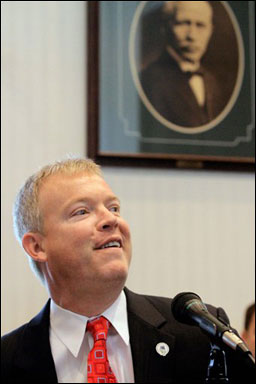Bills would legalize concealed carry in Wisconsin (UPDATE)
By: Associated Press//May 4, 2011//
By SCOTT BAUER
Associated Press

MADISON, Wis. (AP) — Carrying concealed weapons in Wisconsin would be legalized under Republican-backed bills unveiled Wednesday.
Wisconsin and Illinois are the only states that currently don’t allow the carrying of concealed weapons, but lawmakers in both states are pushing measures this year that would allow them to join with the rest of the country. If passed and signed into law, only Washington, D.C., would ban carrying concealed.
The Wisconsin measure has a good chance of becoming law, as Republicans control both the Senate and Assembly and GOP Gov. Scott Walker has indicated his support for the idea. Republicans passed it in 2004 and 2006, but both times then-Gov. Jim Doyle, a Democrat, vetoed it.
Illinois Gov. Pat Quinn, a Democrat, has said he will veto the legislation in his state but a bipartisan group of lawmakers are working to get enough support for an override.
Police organizations in both states have vociferously opposed legalizing carrying concealed weapons, saying it puts public safety officers and the public in danger. But the National Rifle Association and other supporters of the legalization argue it’s needed for people to protect themselves from criminals, many of whom do not obtain firearms legally.
The Wisconsin bills are moving quickly. Bill sponsors Sen. Pam Galloway, R-Wausau, and Rep. Jeff Mursau, R-Crivitz, circulated them Wednesday with a deadline of Monday for co-sponsors. A hearing in Wausau was scheduled for May 12.
Senate Majority Leader Scott Fitzgerald said he didn’t expect the bill would be ready for a vote this month. When it comes up depends on when its sponsors and others can reach agreement on what form the proposal should take, he said.
One of their bills would require someone to obtain a license to carry a concealed weapon while the other proposal would not require obtaining a license.
“It’s time for Wisconsin to fully recognize the right of all its citizens to preserve their security and the security of their families,” Mursau said in a statement. “Criminals in Wisconsin are going to have to start asking themselves if their potential crimes are worth the risk of encountering someone ready to fully defend themselves.”
Current Wisconsin law carries with it a fine of up to $10,000 and nine months in jail for anyone who carries a concealed weapon, although there are exceptions for current and retired law enforcement officers. Courts have also ruled that business owners and homeowners can carry concealed weapons in some instances.
Under the bill creating the licensing system, people 21 years old and over could apply to obtain a license valid for five years at a time from the state Department of Justice. Applicants would have to pay a $13 background check fee and an application fee of up to $52.
Concealed weapons would not be allowed in police stations, jails, courthouses, beyond the security checkpoint in airports, or on school grounds. Homeowners, businesses and governments could also prohibit concealed weapons on their property. Likewise, convicted felons, convicted domestic abusers, anyone with a restraining order against them and anyone committing a crime could not legally carry a concealed weapon.
Concealed weapons are defined as a handgun, an electric weapon, a billy club, or a knife other than a switchblade.
Legal News
- History made in Trump New York trial opening statements
- Prosecutor won’t bring charges against Wisconsin lawmaker over fundraising scheme
- Republican Wisconsin Senate candidate says he doesn’t oppose elderly people voting
- Vice President Harris to reveal final rules mandating minimum standards for nursing home staffing
- Election workers fear threats to their safety as November nears
- Former law enforcement praise state’s response brief in Steven Avery case
- Eric Toney announces re-election bid for Fond du Lac County District Attorney
- Former Wisconsin Democratic Rep. Peter Barca announces new bid for Congress
- Republicans file lawsuit challenging Evers’s partial vetoes to literacy bill
- More human remains believed those of missing woman wash up on Milwaukee Co. beach
- Vice President Harris returning to Wisconsin for third visit this year
- Wisconsin joins Feds, dozens of states to hold airlines accountable for bad behavior
WLJ People
- Power 30 Personal Injury Attorneys – Russell Nicolet
- Power 30 Personal Injury Attorneys – Benjamin Nicolet
- Power 30 Personal Injury Attorneys – Dustin T. Woehl
- Power 30 Personal Injury Attorneys – Katherine Metzger
- Power 30 Personal Injury Attorneys – Joseph Ryan
- Power 30 Personal Injury Attorneys – James M. Ryan
- Power 30 Personal Injury Attorneys – Dana Wachs
- Power 30 Personal Injury Attorneys – Mark L. Thomsen
- Power 30 Personal Injury Attorneys – Matthew Lein
- Power 30 Personal Injury Attorneys – Jeffrey A. Pitman
- Power 30 Personal Injury Attorneys – William Pemberton
- Power 30 Personal Injury Attorneys – Howard S. Sicula











